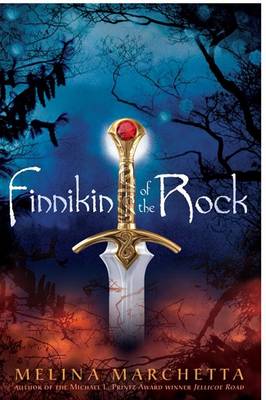Reviewed by nannah on
I also feel like this book is for the older side of YA. There’s a lot of detailed description of sex, there’s some rape, and there’s very mature themes.
Content warnings:
In-book sexism
Rape attempt (and many mentions of rape)
Racism
Slavery
Representation:
Not sure here … there are lots of different skin colors in this world, but they’re not very well explained by the world or the prose
Finnikin and the late King’s First Man have been wandering the island of Skuldenore, taking note of their fellow exiles and trying to find the heir of their beloved lost Kingdom, Lumatere. Ten years ago their royal family was murdered, and a curse was placed over their land -- with an imposter king sitting on their throne. Now Finnikin meets Evanjalin, a girl who can walk through her sleep to experience other people’s memories. She claims she can lead Finnikin to the heir of Lumatere.
Diving right in here, the entire world of Finnikin of the Rock takes place on Skuldenore, an island that … I can’t decide if it’s large or not … and neither the map nor the prose gives me any idea of its dimension. What it does give me is the number of inhabitants: six thousand. That’s … a tiny number! There are a ton of different kingdoms, languages, faiths -- and most notably: different ethnicities here. It could be believable except there are also a ton of different skin colors and races, too? How? Skin color is based on how close the population is to the equator … nothing about this world makes sense (especially because there are also “natives” living here who are pale white → more on that later), unless there is a colonialism situation that the book never touched on.
So those “natives” … who are white. They’re portrayed as very stereotypical Native Americans. Maybe it’d be better to refer to them as indigenous people or an ethnic minority rather than “the natives” (like white ethnic minorities in Europe -- especially because like Melina Marchetta says in the acknowledgements, she wanted to take a lot of things and issues from real life). It just seems extremely disrespectful to separate culture from skin color in this current atmosphere [even ten years ago, when this book was written].
The treatment of the natives in this book is so stereotypically racist, it’s a little outrageous. They’re basically first seen as savages, firing upon Finnikin and co. They use broad iron arrowheads like one would for animal hunting, unlike the rest of Skuldenore, who use swords, throwing knives, shields, etc. They speak in “grunts and guttural sounds”, have spirit warriors that are never explained, and mystical places like the “old country” (also never expanded upon), where the “nocturnal world combined with the spirits of the past as they screeched and moaned and possessed the night”. Aka the way we white people just love to fetishize the heck out of Native American beliefs.
All I’m saying here is there’s a way to add indigenous cultures to a book respectfully, and I really don’t think this is it.
Besides the world building, there's our protagonist: Finnikin. The entire book has this Game-of-Thrones-like atmosphere (HBO version, of course), full of sexism and slavery and women being treated like literal things. Unfortunately, Finnikin is no exception. He’s a macho man who can’t let a woman be better than him at anything, can’t let a woman humiliate him, etc., kind of guy. Definitely someone I do not want to root for. In the prose, he has to tell us (when Evanjalin touches him) that “he was no stranger to women and had felt their hands on all parts of his body, but …” like thanks? Who cares, mr. Big Shot? He admits frustration at Evanjalin’s “inability to take orders” (like what, a servant?), he gets mad when she corrects his pronunciation in a language he doesn’t know, and -- best of all -- he can’t deal with the fact that when she’s Queen, she has to choose him to be King, not the other way around. It’s like the entire plot of the last section. He even admits it would be fine if it were the other way around! But then he’s okay with it because at least “I’ll be King to her.”
What an asshole. There were few times I liked him.
Okay, overall I kept wanting to love this book, because so many others do, and I’ve been wanting so badly to love a book for so long. The beginning was slow and madding: basically with Finnikin wandering around having sex and being manly and arguing with Evanjalin. The second half got really good (except for that last section). There was SO much I loved about that second half. There were people coming together, a real sense of hope, new women characters -- but it just couldn’t make up for the first half.
I also saw that the next book centers around Froi … the boy who attempted to rape Evanjalin … I’m not sure I’ll be reading on. I know Evanjalin herself accepted Froi’s character growth, and just will “never forget” what he did; however, I don’t know if I can do the same. An entire book about the character who did that to the protagonist? I’m sorry, my own trauma is screaming way too much for me to accept this. So … an okay fantasy book overall, but I just can’t stomach reading on.
Reading updates
- Started reading
- 24 October, 2019: Finished reading
- 24 October, 2019: Reviewed
